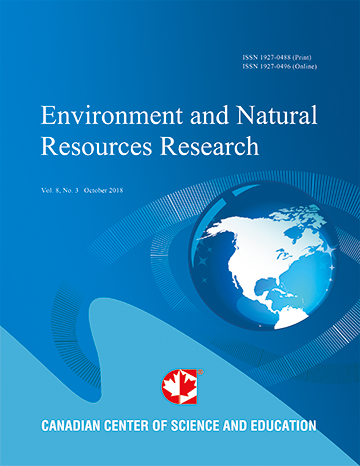Hydrogeochemical Characterization of Dug Well Water and Its Suitability for Domestic Water Supply in the Village of Passakongo, Dedougou municipality, Burkina Faso
- Aboubakar Sako
- Saga Sawadogo
- Moise Yoni
- Mamadou Nimi
- Ousseni Zongo
- Ousmane Bamba
Abstract
Hydrogeochemical characterization and suitability study of dug well water for domestic purpose were carried out in a semi-arid rural village in Burkina Faso. Thirty water samples were collected from 15 wells in dry and wet seasons, 2017. Electrical conductivity (EC) and total dissolved solids as well as major ions of all samples were within the World Health Organization (WHO) permissible limits for drinking water. In contrast, nine wells had pH beyond the WHO limit during the dry season and one well had very high NO3- concentration in the wet season. Most wells were seriously polluted with total Cr (CrT) in both seasons (11 and 14 wells in dry and wet seasons, respectively). Although Pb was not detected in the wells during the dry season, six wells showed Pb concentrations exceeding the WHO guideline limit for drinking water in the wet season. Graphic interpretation, including the Piper diagram, major ion ratios and Na/Cl versus EC, were used to characterize the hydrochemistry and water – rock interaction within the wells. The dominant hydrochemical facies of the wells was Ca-HCO3 during the dry season, reflecting the influence of silicate weathering. Following loadings of agricultural and domestic effluent, the hydrochemical facies shifted to more mixed type during the wet season. All samples had negative chloro-alkaline indices, suggesting retention of Ca2+ and Mg2+ by the aquifer materials and release of Na+ and K+ into the groundwater. In addition to silicate weathering, the hydrochemistry and water quality of the majority of the wells were partially controlled by the evaporation process and longer water–rock interaction in the dry season. In contrast, recharge and dilution effects appeared to alter the natural hydrochemistry of the wells in the wet season. Geochemical characterization has clearly shown that seasonal changes do affect the dug well water quality. The study also demonstrated that, in terms of CrT and Pb, water from the majority of the wells was not suitable for drinking. A special attention should be therefore paid to groundwater quality protection in the
- Full Text:
 PDF
PDF
- DOI:10.5539/enrr.v8n3p126
Journal Metrics
Google-based Impact Factor (2016): 6.22
h-index (November 2017): 12
i10-index (November 2017): 19
h5-index (November 2017): 11
h5-median (November 2017): 12
Index
Contact
- Emily LinEditorial Assistant
- enrr@ccsenet.org
